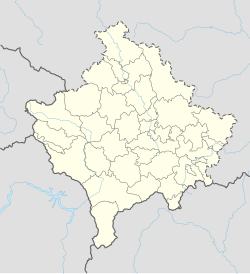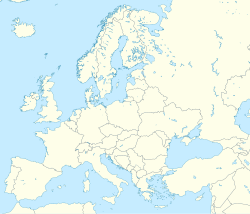Parteš
Parteš
| |
|---|---|
Town and municipality | |
 Church of the Holy Trinity in Parteš | |
| Coordinates: 42°24′07″N 21°26′01″E / 42.40194°N 21.43361°E | |
| Country | Kosovo |
| District | District of Gjilan |
| Settlements | 3 |
| Municipality status | 19 August 2010 |
| Government | |
| • Provisional president | Dragan Petković (GIS) |
| Area | |
• Total | 18.3 km2 (7.1 sq mi) |
| Elevation | 473 m (1,552 ft) |
| Population (2013 (est.)) | |
• Total | 1,738 |
| • Density | 95/km2 (250/sq mi) |
| Time zone | UTC+1 (CET) |
| • Summer (DST) | UTC+2 (CEST) |
| Postal code | 38251 |
| Website | kk |
Parteš (Serbian Cyrillic: Партеш) or Partesh (Albanian definite form: Parteshi), is a town and municipality located in the Gjilan District of Kosovo. The municipality was established on 19 August 2010. It is inhabited by Serbs, and as of 2013, it has an estimated population of 5,300 inhabitants.
Settlements
The municipality consists of town of Parteš and two villages: Pasjane and Donja Budriga.
-
Parteš, in relation to Gjilan.
-
Parteš municipality.
Culture
The settlements of Parteš, Donja Budriga and Pasjane are inhabited by ethnic Serbs. There are four Serbian Orthodox churches within the municipality.[1] There are pilgrimage sites at medieval religious ruins.[1]
Economy
The economy is based mainly on dairy production and small trade.[1]
Education
There are two primary schools and five secondary schools within the municipality.[1]
Demographics
The municipality of Parteš is inhabited by ethnic Serbs. The ECMI calculated, based on 2010 and 2013 estimations, that the Parteš municipality was inhabited by 5,300 Serbs (99.96%).[2]
According to the 2011 census, which is unreliable due to partial boycott by Serbs and other minorities,[3] the settlement of Parteš alone had 478 residents, all of whom were Serbs (100%); the Parteš municipality had 1,787 residents, 1,785 of whom were Serbs (99.9%).[1] The municipality of Parteš includes the town and two villages. It is one of the Serbian enclaves in Kosovo (located outside Serb-inhabited North Kosovo), alongside five other municipalities: Gračanica, Štrpce, Novo Brdo, Ranilug and Klokot.[2] After the Brussels Agreement of 2013, representatives of Serbia and Kosovo agreed that the municipality was to become part of the Community of Serb Municipalities.[4]
| Settlement | 1948 | 1953 | 1961 | 1971 | 1981 | 1991 |
|---|---|---|---|---|---|---|
| Donja Budriga | 617 | 689 | 801 | 983 | 1.018 | 1.178 |
| Parteš | 775 | 878 | 1.009 | 1.203 | 1.274 | 1.513 |
| Pasjane | 1.325 | 1.448 | 1.508 | 1.845 | 1.974 | 2.030 |
| Total | 2.717 | 3.015 | 3.318 | 4.031 | 4.266 | 4.721 |
Politics
The municipality in planned to be included in the Community of Serb Municipalities, according to the 2013 Brussels Agreement.
The 2013 local elections, held in November, saw 2,770 voters, 63.8% of the total number of registered voters in the Parteš municipality (4,342) according to the last elections.[1] The elections saw the following results in the local government, the municipal assembly which has 15 seats:[1]
- Independent Liberal Party (SLS), 37.60%—6 seats
- Citizens' Initiative Srpska (GIS), 18.20%—3 seats
- Democratic Initiative (DI), 13.04%—2 seats
- People's Initiative (NI), 12.57%—2 seats
- Serb Citizens' Initiative Pasjane (SGI P), 6.02%—1 seat
- Serb Citizens' Initiative Donja Budriga (SGI DB), 6.02%—1 seat
See also
References
- ^ a b c d e f g OSCE & September 2015.
- ^ a b ECMI Kosovo 2013.
- ^ "ECMI: Minority figures in Kosovo census to be used with reservations". ECMI. Archived from the original on 2017-05-28. Retrieved 2017-10-24.
- ^ Vukoičić, Danijela; Milinčić, Miroljub (2020). "Kosovska Mitrovica as Two Parallel Cities in the Twenty-First Century". In Mihaylov, Valentin (ed.). Spatial Conflicts and Divisions in Post-socialist Cities. New York City: Springer. p. 61. ISBN 978-3-03061-765-3.
It is planned for the Serbian Municipalities Community (SMC) to have the President, the Vice President, the Council and the Parliament that consists of ten municipalities (Northern Kosovska Mitrovica, Zvečan, Zubin Potok, Leposavić, Parteš, Ranilug, Novo Brdo, Gračanica, Štrpce, and Klokot.)
Sources
- "Profile of Parteš/Partesh". OSCE. September 2015.
- "Community Profile: Serb Community" (PDF). ECMI Kosovo. 2013.
External links
- "Општина Партеш". Archived from the original on 2017-08-06. Retrieved 2015-12-19.
- Parteš Municipality






